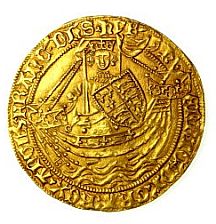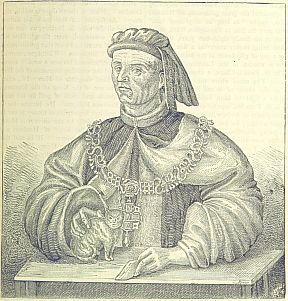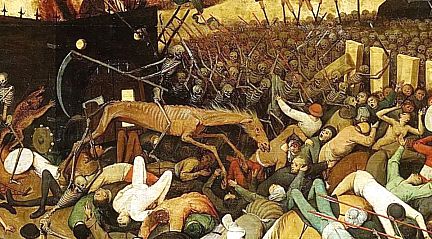Here is a story to entertain. I wrote it as Covid 19 spread across the world, reminding me of previous pandemics. This story is not fiction exactly, it’s history, and history is always subjective, open to challenge and re-evaluation, but this is my version and it makes a good tale. Allegedly.
There is an old rhyme:
For the want of a nail, a shoe was lost.
For the want of a shoe, the horse was lost.
For the want of a horse, the rider was lost.
For the want of a rider, the battle was lost.
For the want of the battle, the kingdom was lost
And all for the want of a horseshoe nail.
No one know what kingdoms will be lost when one little nail messes things up.
Once upon a time, back in the Middle Ages, Venice was the great trading power in the Mediterranean, so aggressive against its rivals that it even persuaded crusaders to divert from their intended goal, Jerusalem, and sack Constantinople instead. That is one horseshoe nail with far-reaching consequences, but I digress. Back to trade… Other Italian city states wanted a share of the action too. Genoa moved in on the Black Sea and established a large fortified trading base at Kaffa (now Feodosiya) on the Crimean coast.
One day some Genoese merchants, out for a stroll, got in a bit of a barny with a bunch of the Mongol locals, in the course of which a local was stabbed to death. This is my horseshoe nail. The end result of that street brawl was economic upheaval, the collapse of feudalism, the rise of capitalism, the Reformation, the break-up of Western Christendom and, ultimately, Hitler.
How?
The brawl and the death led to a riot against the Genoese, who locked themselves in their sea-side enclave. The angry locals besieging them were joined by the Mongol army, but the siege began to falter as sickness started to spread among the soldiers, as it tends to do in siege situations. Rather than simply give up, the Mongols took a last swipe at their enemy by catapulting their dead into the Genoese stronghold. The Genoese merchants tried to deal with the corpses but in the end decided to give up and head for home, escaping by sea.
Their first major port of call was Messina in Sicily – by which time some on the ship were dead and others were dying. The inhabitants of the port realised that they’d brought an unwelcome visitor and forced them out to sea again, but too late. At each port where the ship tried to put in on its return to Genoa, it brought the Black Death with it. Everywhere that ships and trade went, the Pestilence went too, all around the Mediterranean, all across Europe, to Spain, to Scotland, to Moscow, mutating at it went, from bubonic plague (pretty deadly) to pneumonic and septicemic plague (totally deadly). In the course of 3 years, till 1350, about a third of the population of Europe was wiped out, especially the old, sick, weakened and malnourished.
After such catastrophes, populations often spring back – the strongest have survived. A new generation was born. Then the plague returned in 1361 and hit especially hard at the young. This time there was no instant recovery. The population in England (and conquered Wales) took another 500 years to return to its 13th century levels.
The result of it all, in England at least, was the collapse of feudalism, which had been built on the backs of vast armies of peasant labourers tied to the land. Now they were in short supply, and despite attempts to round them up and bring them back when they ran off to the big cities, they became uppity. They revolted. Attempts were made to put them down, but there was no stopping the flow. Land owners had to start paying for labour and renting out land. Meanwhile, in the cities, merchants were on the rise, relying on money and trade instead of forced peasant labour.

It had been happening for a long time, of course. Earlier Medieval monarchs, in desperate need of money as well as feudal levies, had relied on the only source of capital, the Jews, since Christians weren’t supposed to soil themselves with usury, charging interest on loans (the basis of most modern economies). Edward I, finding himself in more debt than he liked, had solved his problem by defaulting on his debts and throwing the Jews out of England. But that left him needing another source of finance. Italian banks, which had learned not to be squeamish about charging interest, stepped in and, when kings, once more, defaulted on their debts, the banks went bankrupt. Kings started borrowing off their noble subjects instead – and they too went bankrupt.

But then there were the merchants of London. By the early 15th century, after the plague, a Lord Mayor of London, who had bankrolled Richard II, Henry IV and Henry V, munificently tore up the debts the king owed him, to show he was so rich he didn’t need repaying. His name was Sir Richard Whittington. (The cat was added to his legend a few centuries later.)
It took the great landowners a few more centuries to realise that they were no longer the real power in the kingdom, but the city was already on top.
In matters of faith, the Black Death knocked the wind out of easy early Medieval piety. The Church failed to save people. They were abandoned, forced to confess to other lay men or even, God help us, if all else failed, to women. Priests died as fast as anyone, faster if they were properly dutiful in attending the dying. God hadn’t saved them. Many abbeys that should have supplied replacements or offered help, locked their doors to keep contagion out, and their street cred plummeted.

Anti-clericalism rose. The Church was left wallowing in corruption. Early “heresies” of men like Wycliffe were fought with flames, but no fire could stop the eventual emergence of Protestantism under Luther, Calvin and the rest. Europe was riven with religious division – which still staggers on in Northern Ireland and certain football grounds.

Some gave up on religion entirely, opening the way for the rationality of the modern era. Others became fanatical in their beliefs instead, convinced of God’s punishment and determined to find scapegoats. Edward I had deprived England of one easy target, but on the continent murderous anti-semitism swept country after country, because it went without saying that the plague must have been caused by Jews poisoning Christian wells. Anti-semitism had been simmering for centuries, ever since St John put the blame for the crucifixion on the Jews, but now it came to the boil, and the Jews remained the main focus for amorphous fear, rage and insecurity until Hitler arrived to milk it with such industrial efficiency.
So, don't get involved in a street brawl, because you never know where it might lead.
What will be the long-term effects of Covid 19? As Zhou Enlai said of the effects of the French Revolution, it's too early to say.


No comments:
Post a Comment
comments welcome